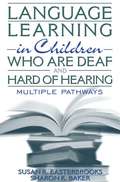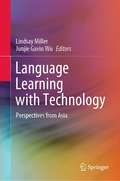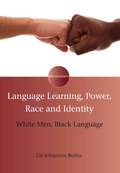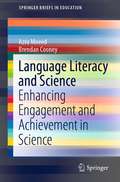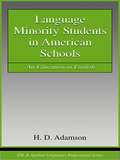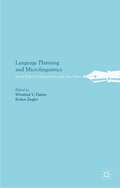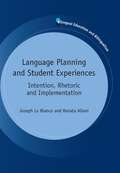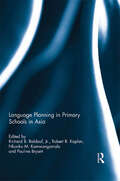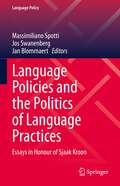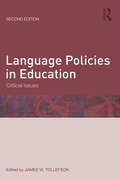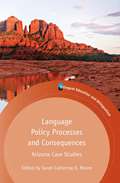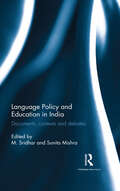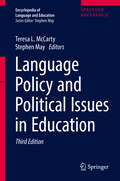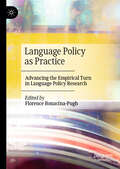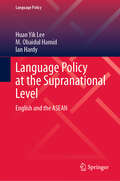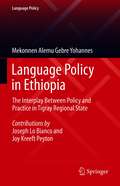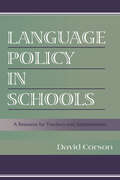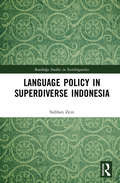- Table View
- List View
Language Learning in Anglophone Countries: Challenges, Practices, Ways Forward
by Martin East Ursula Lanvers Amy S. ThompsonThis edited book focuses on the state of language learning in Anglophone countries and brings together international research from a wide range of educational settings. Taking a contextual perspective on the language learning crisis currently facing Anglophone countries, the authors examine systemic challenges, real-world practices, and broader cultural trends that have an impact on the uptake of modern foreign languages in different Anglophone settings. This book will be of interest to scholars working in applied linguistics and language education, particularly those with a focus on educational policy and Global English.
Language Learning in Children Who Are Deaf and Hard of Hearing: Multiple Pathways
by Susan R. Easterbrooks Sharon BakerThis book addresses the language development process from multiple perspectives, drawing on the latest research in bilingual biculturalism, cochlear implant technology and neuroscience. The book presents a unique view of language development, proposing that there are multiple pathways to the acquisition of a system of communication. For parents and educators working with deaf and hard of hearing children.
Language Learning of Adult Migrants in Europe: Theoretical, Empirical, and Pedagogical Issues (Educational Linguistics #53)
by Glenn S. Levine David MallowsThis volume focuses on the learning of host-country languages by migrants in Europe. It identifies, clarifies, and offers insights into issues and central questions related to the learning of host-country languages with an emphasis on adolescent and adult language learners in formal and informal settings. The book draws on data collected following the refugee ‘crisis’ in Europe of 2015-16, which led to dramatic increases in the number of migrants arriving in Europe.
Language Learning with Technology: Perspectives from Asia
by Lindsay Miller Junjie Gavin WuThis book is about language learning with technology, offering readers theoretical insights as well as practical case studies with a focus on Asia and Asian students. Although technology is rapidly advancing and most, if not all, students are already using technology in their everyday lives, traditional teaching/learning practices still exist throughout Asia. This book provides examples, written by representative educators, from a variety of countries/regions and contexts where technology has successfully been used to enhance language learning. In addition to some everyday examples of using technology: Wikipedia, PowerPoint, Google Docs and YouTube, the book also offers the readers an insight into the future possible uses of advanced technology: Augmented Reality, Virtual Reality, Artificial Intelligence and Eye Tracking. The book presents illustrations of how teachers can, and perhaps should, be open to integrating some form of technology into in-class learning or using it to supplement out-of-class activities.
Language Learning, Power, Race and Identity
by Liz Johanson BothaThis book investigates the strategies and identities of colonials who have learned the languages of colonised people, using the context of isiXhosa in South Africa. While power in language learning research has traditionally focused on the powerful native speaker and the relatively disempowered learner, this book studies the inverse, where elites are the language learners. The author analyses the life histories of four white South Africans who acquired isiXhosa during the apartheid years. The book offers insights into relationships between language, power, race, identity and change in their stories and in the broader context of apartheid and post-apartheid South Africa, with its conflicted history and disparities. This book should appeal to researchers interested in studies of language acquisition, narrative and identity, as well as those more broadly interested in South African history, multilingualism and race studies.
Language Literacy and Science: Enhancing Engagement and Achievement in Science (SpringerBriefs in Education)
by Azra Moeed Brendan CooneyThis book presents the findings of two case studies in the 'Making Connections' two-year project funded by the New Zealand Ministry of Education. It shows how science literacy was improved in a state coeducational school with Pacific Island students from diverse linguistic backgrounds. This book details ideas and strategies relevant to schools where English literacy has an impact on the science engagement and achievement of ethnically diverse student populations. It also presents the teaching as inquiry model and its usage by teachers to improve aspects of their teaching strategies.
Language Minority Students in American Schools: An Education in English (ESL & Applied Linguistics Professional Series)
by H. D. AdamsonThis book addresses questions of language education in the United States, focusing on how to teach the 3.5 million students in American public schools who do not speak English as a native language. These students are at the center of a national debate about the right relationship among ESL, bilingual, and mainstream classes. Bilingual education has been banned by constitutional amendment in California and Arizona, and similar amendments are being considered in other states. Language Minority Students in American Schools: An Education in English places this debate and related issues of teaching standard English to speakers of nonstandard dialects, such as black English, within the larger context of language acquisition theory and current methods of language teaching. Adamson draws from the large body of sociolinguistic, psycholinguistic, and educational research, and on his own experience as an English teacher in the U.S. and overseas, to shed light on some of these controversies and on the cognitive, cultural, public policy, and practical issues involved in educating English language learners. Presenting all sides of the issues fairly, he offers a strong endorsement for bilingual and bidialectical education based on programs designed and administered according to the principles discussed in the book and supported by language acquisition theory and classroom research. A strength of the book is the inclusion of original research conducted in a middle school enrolling a majority of Latino students. This research contributes to the field of language education by providing a detailed description of how English language learners study content subjects. Examples from the study are used to illustrate a discussion of Vygotskian learning principles and the relationship between the students' home and school cultures. Language Minority Students in American Schools: An Education in English is intended for students who are preparing to become teachers of English as a second language, and for teachers of other subjects who work with English language learners.
Language Perceptions and Practices in Multilingual Universities
by Maria Kuteeva Kathrin Kaufhold Niina HynninenThis edited book examines language perceptions and practices in multilingual university contexts in the aftermath of recent theoretical developments questioning the conceptualization of language as a static entity, drawing on case studies from different Northern European contexts in order to explore the effects of phenomena including internationalization, widening participation, and migration patterns on language attitudes and ideologies. The book provides cutting-edge perspectives on language uses in Northern European universities by drawing attention to the multiplicity of language practices alongside the prominence of English in international study programmes and research publication. It will be of interest to students and scholars of multilingualism, sociolinguistics, applied linguistics, and education, as well as language policymakers.
Language Planning and Microlinguistics
by Winifred V. Davies Evelyn ZieglerWhilst earlier studies of language planning and of standardisation have tended to study macro processes such as top-down language revitalisation campaigns or language polices at government level, this volume is in line with more recent work aimed at bridging the macro and the micro levels by examining how the two interact and influence each other. The aim of the volume as a whole is to contribute to a better understanding of the motivations underlying language users' decisions to adopt or resist language norms and policies of various kinds in their daily life. The individual chapters cover seven countries - the Czech Republic, Denmark, France, Germany, Japan, Luxembourg and Switzerland - and deal with different sociolinguistic constellations, ranging from communities dealing with variation within one language to those looking for ways to manage a multilingual repertoire.
Language Planning and National Identity in Croatia (Palgrave Studies in Minority Languages and Communities)
by K. Langston A. Peti-StanticFollowing the collapse of the former Yugoslavia, Croatian was declared to be a separate language, distinct from Serbian, and linguistic issues became highly politicized. This book examines the changing status and norms of the Croatian language and its relationship to Croatian national identity, focusing on the period after Croatian independence.
Language Planning and Student Experiences
by Joseph Lo Bianco Renata AlianiThis book is a timely comparison of the divergent worlds of policy implementation and policy ambition, the messy, often contradictory here-and-now reality of languages in schools and the sharp-edged, shiny, future-oriented representation of languages in policy. Two deep rooted tendencies in Australian political and social life, multiculturalism and Asian regionalism, are represented as key phases in the country's experimentation with language education planning. Presenting data from a five year ethnographic study combined with a 40 year span of policy analysis, this volume is a rare book length treatment of the chasm between imagined policy and its experienced delivery, and will provide insights that policymakers around the world can draw on.
Language Planning in Primary Schools in Asia
by Robert B. Kaplan Nkonko M. Kamwangamalu Richard B. Baldauf Pauline BryantIn foreign language education, decisions must be taken on what languages to teach, who will teach them, in which schools (i.e. all, only urban, only rural), in which grades, the number of hours a week, and the cost involved. This book explores the answers to these questions across a number of Asian polities. It illustrates why some of the efforts undertaken are successful and why some are not, why – despite significant investments of time and resources – some students do not seem to acquire the languages being taught, and why some teachers responsible for instruction in the designated foreign languages have problems achieving fluency in the designated language or have other language teaching difficulties. It suggests some strategies various polities might attempt to achieve their stated language learning objectives.This book was originally published as a special issue of Current Issues in Language Planning.
Language Policies and the Politics of Language Practices: Essays in Honour of Sjaak Kroon (Language Policy #28)
by Jan Blommaert Massimiliano Spotti Jos SwanenbergThis edited volume consists of chapters celebrating the career of scholar Sjaak Kroon, who has produced ground-breaking work in the field of ethnography of education, immigrant minority language teaching and language politics. The chapters cover the use of immigrant minority languages in education and the development of policies at all levels and across the globe in this sometimes over-policed field. It particularly focuses on language policy analysis in which both the top-down institutional and the bottom-up ethnographic dimensions are blended, and in which globalization is the main macro-perspective. The chapters describe sensitive tools for investigating, unravelling and understanding the grey space connecting formal language policies to informal politics and practices of language on the ground.
Language Policies in Education: Critical Issues
by James W. TollefsonHow do language policies in schools create inequalities among learners? How do policies marginalize some students while granting privilege to others? How do language policies in education serve the interests of dominant groups within societies? How can linguistic minorities further their interests through attempts to change language policies in schools? This new edition of Language Policies in Education takes a fresh look at these enduring questions at the heart of fundamental debates about the role of schools in society, the links between education and employment, and conflicts between linguistic minorities and "mainstream" populations. Reflecting developments in language policy since the publication of the first edition in 2002, all chapters are original and substantial contributions to the study of language policy and exemplify major theories and research methods in the field. Chapter authors are major scholars in language policy and critical language studies. The case studies, international in scope, present cutting-edge analyses of important language policy debates in countries around the world.
Language Policy Challenges in Multi-Ethnic Malaysia
by Saran Kaur GillSet in Malaysia, this book encompasses language and cultural policy challenges that many other multi-ethnic nations currently have to address. The people of Malaysia constitute a diverse ethnic, linguistic and cultural population and one of the continuing challenges is the development and establishment of the Malaysian people's ethnic, national and global cultural identities. This challenge is evident in the journey of language and cultural policy from the post-independence period to the 21st century; a period of over 50 years. The book highlights political, socio-cultural, economic and knowledge economy factors as they impact on decisions made by the government with regard to language policy in the various educational systems. It examines decisions made on the selection of the national language, the medium of instruction in educational systems, the varying changes in language policy for the field of science and technology and the maintenance and sustenance of minority languages.
Language Policy Processes and Consequences
by Sarah Catherine K. MooreThis book accessibly and comprehensively outlines the highly complex case of the English-only movement and educational language policy in Arizona. It ranges from early Proposition 203 implementation to an investigation of what Structured English Immersion (SEI) policy looks like in today's classrooms, and concludes with a discussion on what the various cases mean for the education of English learners in the state.
Language Policy and Education in India: Documents, contexts and debates
by M. Sridhar Sunita MishraThis book presents a history of English and development of language education in modern India. It explores the role of language in colonial attempts to establish hegemony, the play of power, and the anxieties in the nineteenth- and early-twentieth-century India. The essays in the volume discuss language policy, debates and pedagogy as well as larger overarching questions such as identity, nationhood and sub-nationhood. The work also looks at the socio-cultural and economic factors that shaped the writing and publishing of textbooks, dictionaries and determined the direction of language teaching, specifically, of English language teaching. Drawing on a variety of archival sources — policy documents, books, periodicals — this book will be of great interest to scholars and researchers of linguistics, language teaching, cultural studies and modern Indian history.
Language Policy and Political Issues in Education
by Teresa L. Mccarty Stephen MayLanguage has too often been studied in isolation from the social and political conditions in which it is used. The late David Corson, the General Editor of the first edition of the Encyclopedia of Language and Education, held the position that an acute understanding of theory was a necessary prerequisite for action, not an alternative to it, especially if one were hoping to change policies for the better. The contributions in this volume acknowledge the centrality of the politics of language, highlighting the importance of the social and political contexts of language policy and language education. This is one of ten volumes of the Encyclopedia of Language and Education. The Encyclopedia bears testimony to the dynamism and evolution of the language and education field, as it confronts the ever-burgeoning and irrepressible linguistic diversity and ongoing pressures and expectations placed on education around the world.
Language Policy as Practice: Advancing the Empirical Turn in Language Policy Research
by Florence Bonacina-PughThis edited book brings together original contributions from scholars working across Language Policy and Planning to advance the recent 'Empirical turn' that has taken place in the field. All the chapters in the volume show how Language Policy can be conceptualized 'as practice' in a variety of domains, ranging from the home to the workplace, schools, and higher education. The authors also suggest further theoretical, methodological, and empirical developments for the discipline in light of this epistemological shift. A Foreword and an Afterword shed light on the theoretical and empirical lineage of this volume and show how this book contributes to the humanization of Language Policy research. This book will be of interest to scholars and post-graduate students working across Language Policy and Planning, Language in Education Policy, and Family Language Policy, as well as those in adjacent fields including Education Policy, Classroom Discourse, Linguistic Anthropology, Sociologyof Education, and Multilingualism.
Language Policy at the Supranational Level: English and the ASEAN (Language Policy #37)
by Ian Hardy M. Obaidul Hamid Huan Yik LeeThis book provides a critical examination of the English-only policy of ASEAN, the Association of the ten Southeast Asian nations. It presents the ASEAN language policy and planning (LPP) journey through time: rationalising English as the sole working language for ASEAN in the past, followed by a critique of the status quo considering regional complexities and dynamics, and finally exploring alternative linguistic futures for ASEAN and the Southeast Asian region. The book also offers methodological innovations in LPP research by utilising the largely underrepresented and undervalued agency of 'people with expertise'. The authors argue for a multilingual commitment towards pursuing an agency of 'projectivity' in co-constructing imagined LPP possibilities to reflect the region's socio-historical context, socio-political intricacies, and socio-linguistic diversity. The way forward is a more inclusive, equitable, balanced, and responsible approach to LPP, both regionally and globally. The book engages with both deconstructive and constructive paradigms, offering promising proposals for dealing with key language issues and contemporary challenges. This book will be interesting reading for language and education scholars, sociolinguists, historians, political scientists, policymakers, diplomats, language activists, media personnel, business leaders, tourism players and other language policy and planning actors operating at national, sub-national and supra-national levels.
Language Policy in Ethiopia: The Interplay Between Policy and Practice in Tigray Regional State (Language Policy #24)
by Mekonnen Alemu YohannesThis book examines the interplay and tensions between hegemonic and counter-hegemonic language policy and processes in Tigray, a regional state of Ethiopia, in the period of pre- and post-1991. Viewing language use and language policy as dynamic social and ideological processes, the book presents Ethiopia as an example of language policy creation and implementation over time, in a highly volatile political context. The case of Ethiopia is unique in that different language policies and practices were put in place as the country’s leaders changed through political takeovers. Declared language policies were not always implemented, and those implemented were often protested. The book starts with an overview and review of language policy and planning, followed by a chapter on the history of such planning in Ethiopia. It then presents the methodology used for the study, and examines the appropriation of hegemonic LPP, patterns of resistance, schools and public sites as centers of resistance, and the emergence and development of specific patterns of language use in different regions of the country. The book ends with recommendations for future research, and draws the overall conclusion that since LPP is a dynamic and multilayered contextual process, official or de facto language policy is often undermined by overt or covert unofficial language policies, ideologies, mechanisms, and agents that result in different patterns of language use.
Language Policy in Higher Education
by F. Xavier Vila Vanessa BretxaIn today's increasingly interconnected, knowledge-based world, language policy in higher education is rapidly becoming a crucial area for all societies aiming to play a part in the global economy. The challenge is double faceted: how can universities retain their crucial role of creating the intellectual elites who are indispensable for the running of national affairs and, at the same time, prepare their best-educated citizens for competition in a global market? To what extent is English really pushing other languages out of the academic environment? Drawing on the experience of several medium-sized language communities, this volume provides the reader with some important insights into how language policies can be successfully implemented. The different sociolinguistic contexts under scrutiny offer an invaluable comparative standpoint to understand what position can - or could - be occupied by each language at the level of higher education.
Language Policy in Schools: A Resource for Teachers and Administrators
by David CorsonLanguage Policy in Schools provides school administrators and teachers a practical approach for designing a language policy for their school and for dealing with the language issues that confront schools, particularly those operating in settings of linguistic and cultural diversity. It can be used as a text in teacher and administrator preparation programs, graduate programs, and in-service and professional development programs. Special features include: * a clear, jargon-free writing style that invites careful reading; * abundant examples that students of education everywhere can learn from--including samples of school language policies developed for real schools by real teacher-researchers; * questions at the end of each chapter to highlight key points and stimulate informed discussion among pre-service and experienced teachers and administrators; and * an up-to-date international and cross-cultural biography.
Language Policy in Superdiverse Indonesia (Routledge Studies in Sociolinguistics)
by Subhan ZeinIndonesia has an extreme diversity of linguistic wealth, with 707 languages by one count, or 731 languages and more than 1,100 dialects in another estimate, spoken by more than 600 ethnicities spread across 17,504 islands in the archipelago. Smaller, locally used indigenous languages jostle for survival alongside Indonesian, which is the national language, regional lingua francas, major indigenous languages, heritage languages, sign languages and world languages such as English, Arabic and Mandarin, not to mention emerging linguistic varieties and practices of language mixing. How does the government manage these languages in different domains such as education, the media, the workplace and the public while balancing concerns over language endangerment and the need for participation in the global community? Subhan Zein asserts that superdiversity is the key to understanding and assessing these intricate issues and their complicated, contested and innovative responses in the complex, dynamic and polycentric sociolinguistic landscape of Indonesia that he conceptualises as superglossia. This offers an opportunity for us to delve more deeply into such a context through the language and superdiversity perspective that is in ascendancy. Zein examines emerging themes that have been dominating language policy discourse including status, prestige, corpus, acquisition, cultivation, language shift and endangerment, revitalisation, linguistic genocide and imperialism, multilingual education, personnel policy, translanguaging, family language policy and global English. These topical areas are critically discussed in an integrated manner against Indonesia’s elaborate socio-cultural, political and religious backdrop as well as the implementation of regional autonomy. In doing so, Zein identifies strategies for language policy to help inform scholarship and policymaking while providing a frame of reference for the adoption of the superdiversity perspective on polity-specific language policy in other parts of the world.
Language Policy, Culture, and Identity in Asian Contexts
by Amy B. M. TsuiBringing together scholarship on issues relating to language, culture, and identity, with a special focus on Asian countries, this volume makes an important contribution in terms of analyzing and demonstrating how language is closely linked with crucial social, political, and economic forces, particularly the tensions between the demands of globalization and local identity. A particular feature is the inclusion of countries that have been under-represented in the research literature, such as Nepal, Bangladesh, Brunei Darussalam, Pakistan, Cambodia, Vietnam, and Korea. The book is organized in three sections: Globalization and its Impact on Language Policies, Culture, and Identity Language Policy and the Social (Re)construction of National Cultural Identity Language Policy and Language Politics: The Role of English. Unique in its attention to how the domination of English is being addressed in relation to cultural values and identity by non-English speaking countries in a range of sociopolitical contexts, this volume will help readers to understand the impact of globalization on non-English speaking countries, particularly developing countries, which differ significantly from contexts in the West in their cultural orientations and the way identities are being constructed. Language Policy, Culture, and Identity in Asian Contexts will interest scholars and research students in the areas of language policy, education, sociolinguistics, applied linguistics, and critical linguistics. It can be adopted in graduate and advanced undergraduate courses on language policy, language in society, and language education.

